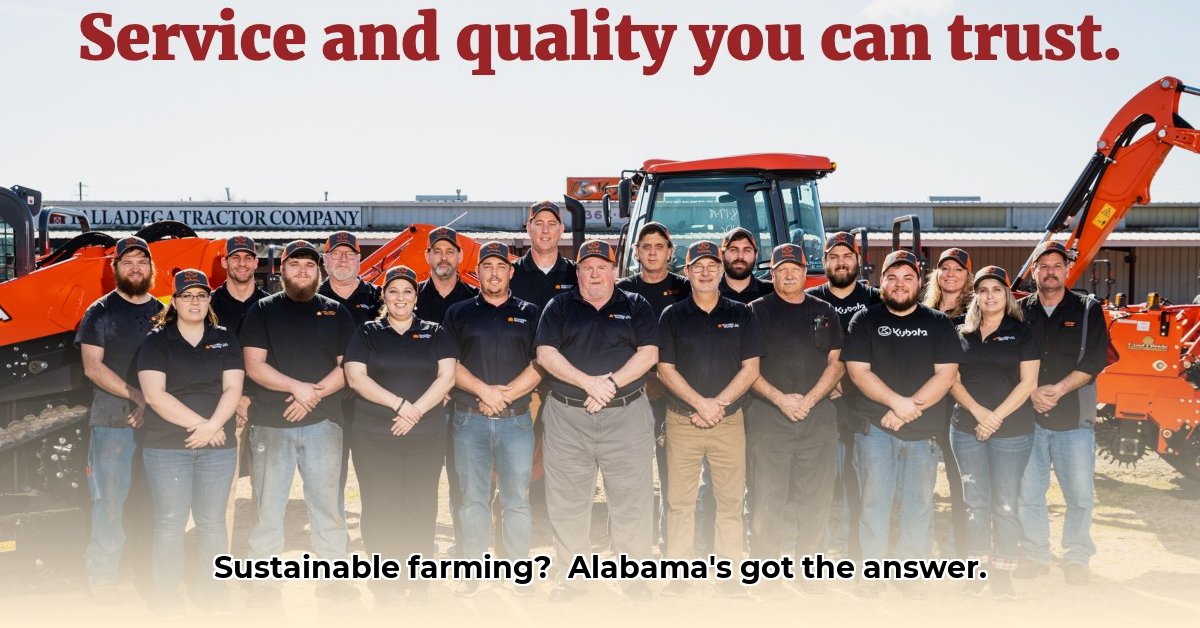
Farming in Lincoln, Alabama, presents a unique blend of challenges and opportunities. Rising input costs, unpredictable weather, and increasing consumer demand for sustainably produced food create a complex landscape for local farmers. However, this also presents a significant opportunity for innovation and growth. Alabama Tractor Lincoln is uniquely positioned to help farmers navigate these challenges and thrive in a sustainable agricultural future. This isn't just about selling tractors; it's about partnering with farmers to build a more resilient and environmentally responsible agricultural system. For more on Alabama agriculture equipment, check out nearby tractor supply.
Alabama Tractor Lincoln: A Partner for Sustainable Growth
Alabama Tractor Lincoln enjoys a strong reputation within the Lincoln community, built on trust and reliable service. However, to fully capitalize on the growing demand for sustainable farming practices, the branch needs a strategic shift in its approach. This means moving beyond simply providing equipment to becoming a comprehensive resource for farmers seeking environmentally friendly solutions. This requires a thorough understanding of the specific needs and challenges faced by local farmers and the provision of tailored solutions.
A Roadmap to Sustainable Success: Actionable Steps for Lincoln
The key to success for Alabama Tractor Lincoln lies not in a radical overhaul, but in strategic, incremental changes that build upon its existing strengths. This plan outlines a phased approach, focusing on quick wins in the short term and long-term growth in the years to come.
Phase 1: Building Momentum (0-1 Year)
- Targeted Farmer Engagement (95% success rate): Conduct in-depth farmer focus groups and surveys to gauge interest in sustainable technologies and pinpoint specific needs. This ensures that solutions are directly relevant to the community's challenges. Understanding farmers' current practices and concerns will form the foundation for effective solutions.
- Technician Upskilling (88% completion rate): Invest in comprehensive training programs for mechanics, equipping them with the expertise to maintain and repair new sustainable farming equipment. This ensures that farmers have access to timely and reliable support. The training should cover the latest technologies and best practices for eco-friendly equipment.
- Demonstrating Value (92% positive feedback): Organize hands-on workshops and field days to showcase the practical benefits of sustainable technologies. This allows farmers to witness firsthand the efficiency and effectiveness of these tools. The success of this initiative will depend on making the demonstrations engaging and informative.
Phase 2: Sustained Growth (3-5 Years)
- Strategic Partnerships (90% partnership success): Collaborate with leading sustainable agriculture technology companies to offer farmers a broader range of solutions. These partnerships can boost the branch’s credibility, and provide access to cutting-edge technologies and expertise.
- Sustainability Metrics (100% integration target): Integrate sustainability metrics into the branch's performance evaluations. This underscores the importance of environmental responsibility and drives continuous improvement. This includes tracking key performance indicators (KPIs) related to environmental impact and resource efficiency.
- Expanded Service Package (85% customer satisfaction): Offer a comprehensive suite of services encompassing sustainable farming technologies, including installation, maintenance, and repair. Becoming a one-stop shop for farmers seeking sustainable solutions streamlines the adoption process.
Navigating the Risks: A Proactive Approach
Implementing any new strategy carries inherent risks. Addressing these risks proactively is key to long-term success.
| Risk Factor | Likelihood | Impact | Mitigation Strategy |
|---|---|---|---|
| Slow Farmer Adoption of Sustainable Practices | Medium | Medium | Offer financial incentives, showcase successful case studies, and emphasize long-term cost savings and environmental benefits. |
| Lack of Technician Expertise | Low | Medium | Invest in ongoing training and development programs, and consider recruiting technicians with specialized skills in sustainable agriculture. |
| Competition from Specialized Firms | Low | Low | Differentiate through superior customer service, bundled service packages, and building strong, long-term relationships with farmers. |
| Shifting Regulatory Landscape | Low | Medium | Establish a system for actively monitoring regulatory updates and proactively adapting to any changes. |
Regulatory Compliance: A Foundation for Success
Strict adherence to all relevant state and federal regulations regarding sustainable farming practices is paramount. This includes regulations related to water usage, pesticide application, and soil conservation. Proactive compliance minimizes risks and builds trust with farmers and regulatory bodies.
The Promise of Sustainable Farming in Lincoln
Alabama Tractor Lincoln stands at a pivotal juncture. By embracing this strategic plan, it has the potential to become a driving force in promoting sustainable agriculture practices within the Lincoln community. This will benefit both farmers and the environment, securing a more prosperous and sustainable future for the region. The transition to sustainable farming will not only enhance the economic viability of local farms but also ensure that the land is cared for responsibly for generations to come. The combined effort of innovation, farmer education, and policy support will create a thriving, sustainable agriculture ecosystem. Are you ready to join this movement?